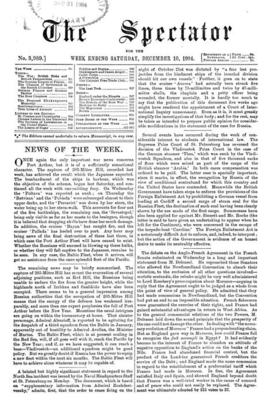Several events have occurred during the week of con- sidera,ble
interest to students of international law. The Supreme Prize Court of St. Petersburg has reversed the decision of the Vladivostok Prize Court in the case of the German steamer 'Thea,' which was sunk by the Vladi- vostok Squadron, and also in that of five thousand sacks of flour which were seized as part of the cargo of the British steamer Arabia.' In both cases compensation was ordered to be paid. The latter case is specially important, since it marks, in effect, the recognition by Russia of the view of conditional contraband for which this country and the United States have contended. Meanwhile the British Government have taken steps to enforce the provisions of the Foreign Enlistment Act by prohibiting a German vessel from loading at Cardiff a second cargo of steam coal for the Russian Fleet, the destination of such coal having been clearly shown by the use made of the first cargo. Summonses have also been applied for against Mr. Sinnett and Mr. Roche (the latter is said to have given an undertaking to appear when he left for the Continent), who were concerned in the escape of the torpedo-boat 'Caroline.' The Foreign Enlistment Act is a notoriously difficult Act to enforce, and, indeed, to interpret ; but the action of the Government is evidence of an honest desire to make its neutrality effective.






























































